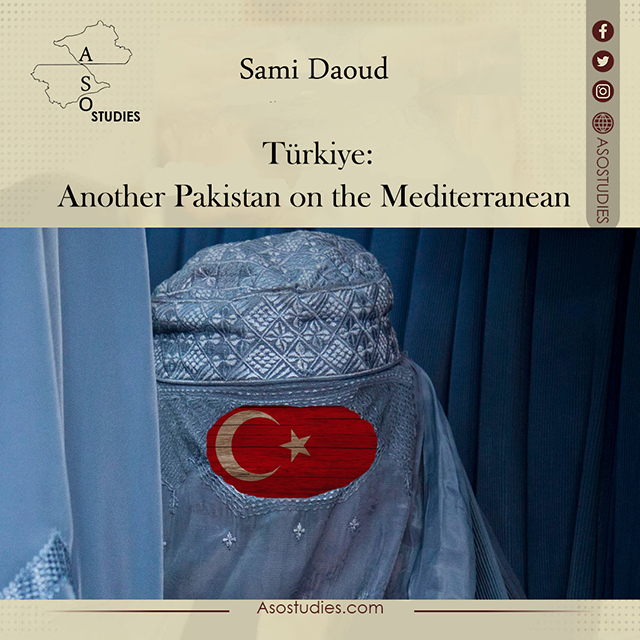Turkey: Another Pakistan on the Mediterranean
Sami DAOUD
Harold Armstrong named "The Grey Wolf: A Study of Dictatorship" on the biography of Mustafa Kemal Ataturk, the founder and ruler of Turkey for three electoral terms (1927 to 1935). The same name later became a symbol of Turkish ethnic gangs, a reference even used by Foreign Minister Cavusoglu in Uruguay (April/2022) in front of Armenian protesters who demonstrated against the visit of the Turkish Minister on the anniversary of the Armenian genocide committed by the Ottomans in 1915, which the Turks deny its legal and moral adaptation. The same designation is also used for a banned organization in some European countries such as Germany and France, called the "Grey Wolves." The group includes Mehmet Ali Agcha, who killed the editor-in-chief of the newspaper Milliyet, Abdi ipekci, in Istanbul in 1979, and two years later attempted to assassinate Pope John Paul II.
This organization entrenched itself in the depths of the Turkish state with the beginning of military coups in Turkey in the early 1960s when the military institution became the main reference for other quasi-honorary authorities. Since the establishment of the Turkish Republic, Ataturk took command of the army and later assumed a civilian position. However, at that time, there was only one party in Turkey, the Republican People's Party led by Ataturk, and the party served as the political wing of the military. Thus, with the beginning of the 1950s, other parties began to emerge, and the Democratic Party led by Adnan Menderes participated in the presidential elections in the early 1960s, winning against Ataturk's party. A group of officers coordinated secret work among them and established the entity of the 'Deep State.' Later, a coup was carried out against Menderes, who was executed, and power returned to its military path under civilian titles. At that time, the liquidation of opponents began under the name of the Grey Wolves organization, which remained the sole arm of the Deep State in Turkey until the start of the Syrian war, and the Sadat Security Company entered the conflict as a new arm of the jihadist groups under the name of the "Syrian National Army."
The phrase "internal enemies" was the subject of Ataturk's farewell speech to the military institution, and it is the same phrase engraved on his tomb, which labeled the internal purification operations against political opponents of the deep state, namely the Kurds, Armenians, and Turkish leftists. This call undermined the role of the army as the guardian of the state in the constitution, during times of war and neutralized it in any political conflict between competing forces for power. The effectiveness of military coups from 1960 to 2016 demonstrated the institution's ability to drag political conflict deep into the state, separate from the political process and its electoral protocols. Even the farcical play of the failed coup attempt in 2016, which was unprecedented in Turkey's history of failed military coups, granted the ruling party of the past twenty years, the Justice and Development Party, exceptional power to amend the constitution in 2017 and consolidate authority once again in the hands of one leader, similar to what the Reichstag fire provided as a pretext for Hitler to issue the Enabling Act in 1933, which consolidated the necessary powers for any dictator..
Turkey was born after six centuries of Ottoman Caliphate rule in 1923,1300. It inherited a cultural legacy of loyalty to a strong ruler, deeply rooted in social tendencies within a state where most of its people only respond to the idea of a charismatic leader. This contradiction between the people's voluntary desire to submit to a strongman and their preference for political pluralism stripped the Turkish electoral process of its institutional symbolism. Elections have shown that when a strongman loses, he restructures the institutions to serve his own interests. This was evident in the case of the municipality of Istanbul, consisting of 34 districts, which Erdogan lost in 2019 to Ekrem Imamoglu. Imamoglu stated in an interview with the French newspaper Le Monde that the government had changed the administrative distribution of municipalities in Istanbul, allowing the major areas to come under the control of the Justice and Development Party, while leaving the smaller areas to the election winner. With these institutional mechanisms, it appears more complex than before for Turkey to transform into a civil state that carries within it two conflicting blocs: the intensity of ethnic gang loyalty or collective invocation of evil and the rule of law on the European periphery.
The Syrian civil war has changed the geographical and political boundaries of Turkey, which now officially occupies Syrian territories with an area of up to 8,835 square kilometers, including a thousand towns. Turkey has administratively incorporated these territories into its border provinces, which Interior Minister Suleyman Soylu considered as part of the Ottoman Millet lands. Erdogan reiterated this during an interview with CNN on May 29, 2023, stating that Turkey would not withdraw from Syrian territories, even if it reconciled with the Syrian Ba'ath regime.
Turkish involvement in the Syrian war has exceeded geographical limits, as it has established "mercenary" groups working for its benefit under the supervision of the SADAT security institution and directed them wherever it desires, including the fronts that bring benefits to Turkish projects in Libya and Azerbaijan, without incurring losses among its own Turkish citizens. It has not even cost the state treasury much in terms of salaries after defaulting on what it promised to pay to the mercenaries deployed to the Karabakh and Libya fronts, according to a investigative report presented by Elizabeth Tsurkov.
These factors have led to numerous approaches regarding Turkey's transformation into another Pakistan in the Mediterranean, within a complex geography of internal ethnic conflicts, including with the Kurds and between the Turks and Arabs in the context of the Syrian refugee crisis. There is also the border conflict over drilling rights in the maritime domain with Greece, not to mention its continued occupation of part of the island of Cyprus since 1974. Recently, it has concluded a suspicious border agreement with the Libyan government in Tripoli. Furthermore, there has been an increase in cultural clashes between Turkey and the European Union, following Erdogan's reintroduction of Islamic practices in Turkish society. For example, during the presidential elections, Erdogan's opposing audience held a mixed-gender rally in Izmir in April 2023, while Erdogan's supporters were segregated by gender. In addition, there is the logistical dilemma of NATO membership and the purchase of the Russian S-400 defense system.
It is worth noting that Pakistani Senator Mushahid Hussain warned former Turkish Prime Minister Ahmet Davutoglu about the danger of Turkey repeating Pakistan's policies in Afghanistan when it supported the Taliban. This warning came after Turkey established the Syrian National Army in 2016. There are also readings that draw parallels between the emergence of Pakistani dictator Zia-ul-Haq and his consolidation of power after the 1985 referendum, in which he acted as a caliph until his death, according to the analysis of Asian affairs expert Michael Kugelman.
It is undeniable that the 400-room palace built by Erdogan for his presidency, and his revival of the idea of the Ottoman Millet to expand Turkey's borders at the expense of neighboring failed states like Syria and Iraq, reveal a colonial policy emanating from the Ottoman legacy, using the same tools. That is, religious pretexts to deceive ignorant people and the use of mercenaries, historically known as the Janissary Army.
The Turkish involvement in the region's wars, the exploitation of natural resources such as water to blackmail neighboring countries, and its refusal to recognize international laws to manage the security and water issues, as well as its connections and documented links to terrorist organizations like ISIS, according to an article published by the Turkish newspaper Cumhuriyet in 2015. Erdogan has consolidated power with his selected team based on their loyalty to him, including his new intelligence director and the former spokesperson for the presidency, Ibrahim Kalin, who wrote sociological articles from an Islamist perspective, including his rejection of the idea that Muslims need Voltaire for religious reform. This will further escalate social tensions within Turkey and exacerbate the violence deeply rooted in the country's history.
Despite the economic disparities between Pakistan and Turkey, the convergence between them is increasing. The contemporary Turkish discourse resembles that of the Pakistani dictator Zia-ul-Haq, mixing Turkish nationalism with religion. It is reinforced by Turkish soft power policies through television dramas consisting of thousands of episodes, translated into Urdu in Pakistan, as well as Arabic and Kurdish, which are popularly consumed and contribute to the Turkish narrative in the region with excessive naivety. Not to mention the Turkish charitable institutions operating under a religious cover in the region and in Africa.
The former Pakistani ambassador to Washington, Hussain Haqqani, shares a similar view to the former US ambassador to Turkey, Eric Edelman, who stated in an article for Bloomberg that Turkey has not yet become another Pakistan, but under Erdogan, it is on a path that could lead to its transformation into another Pakistan in the Mediterranean.

